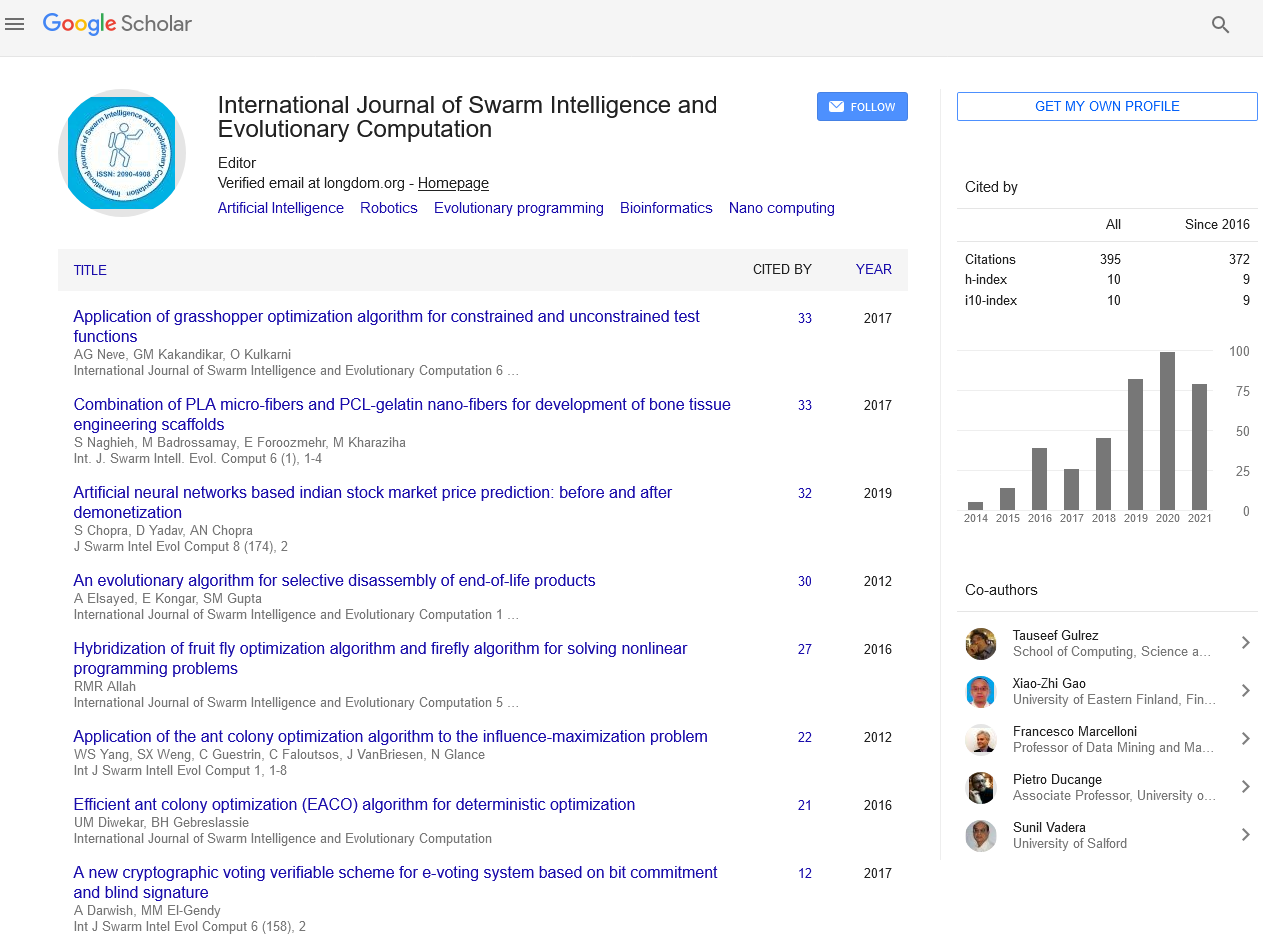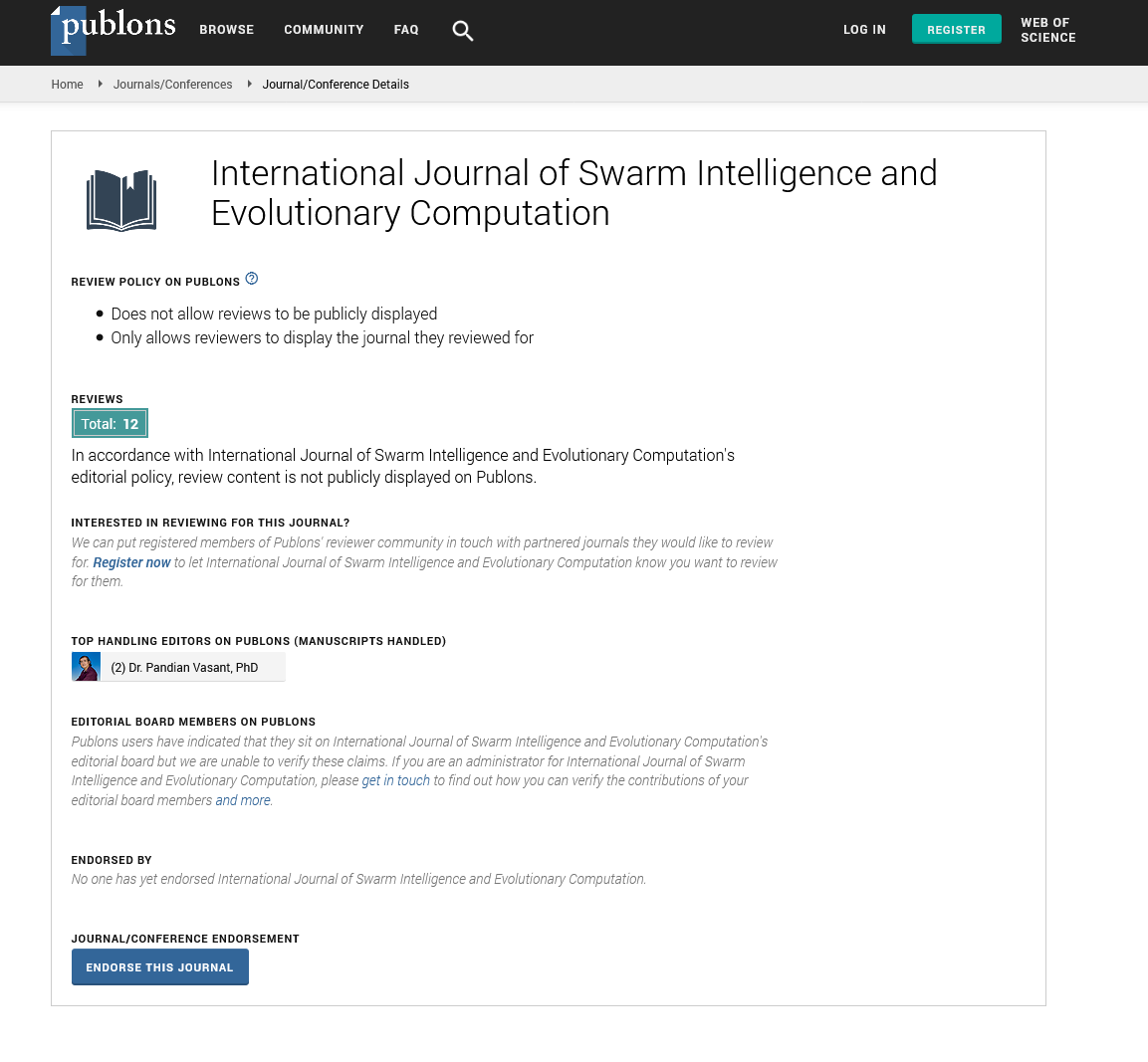Indexed In
- Genamics JournalSeek
- RefSeek
- Hamdard University
- EBSCO A-Z
- OCLC- WorldCat
- Publons
- Euro Pub
- Google Scholar
Useful Links
Share This Page
Journal Flyer

Open Access Journals
- Agri and Aquaculture
- Biochemistry
- Bioinformatics & Systems Biology
- Business & Management
- Chemistry
- Clinical Sciences
- Engineering
- Food & Nutrition
- General Science
- Genetics & Molecular Biology
- Immunology & Microbiology
- Medical Sciences
- Neuroscience & Psychology
- Nursing & Health Care
- Pharmaceutical Sciences
Perspective - (2024) Volume 13, Issue 5
The Impact of Swarm Intelligence on Optimization Problems
Djaafar Abdelaziz*Received: 26-Aug-2024, Manuscript No. SIEC-24-27453; Editor assigned: 28-Aug-2024, Pre QC No. SIEC-24-27453 (PQ); Reviewed: 11-Sep-2024, QC No. SIEC-24-27453; Revised: 18-Sep-2024, Manuscript No. SIEC-24-27453 (R); Published: 25-Sep-2024, DOI: 10.35248/2090-4908.24.13.390
Description
Optimization problems are fundamental to various fields such as engineering, computer science, logistics and finance, where finding the best solution from a set of possible options is critical. These problems can range from simple tasks like resource allocation to complex issues such as network design, machine learning model training, or supply chain optimization. Traditional optimization methods, including linear programming and gradient-based algorithms, have proven effective for certain types of problems, but they often struggle when confronted with complex, high-dimensional and non-linear challenges. When problems involve multiple variables, noisy data, or dynamic constraints, traditional methods may fail to converge to the optimal solution. To overcome these limitations, Swarm Intelligence (SI), a branch of artificial intelligence inspired by the collective behavior of natural systems, has emerged as a powerful alternative.
Swarm intelligence algorithms for complex problems
Swarm intelligence is a family of optimization algorithms that leverage the collective behavior of decentralized systems found in nature. These systems, such as flocks of birds, schools of fish, or ant colonies, exhibit complex, intelligent behavior despite the absence of centralized control. Swarm intelligence algorithms simulate these natural behaviors to explore search spaces, find solutions and adapt to changing environments efficiently. Key swarm intelligence algorithms include Particle Swarm Optimization (PSO), Ant Colony Optimization (ACO) and Artificial Bee Colony (ABC) optimization. These algorithms are particularly well-suited for solving complex, high-dimensional, combinatorial and multi-objective optimization problems.
Particle Swarm Optimization (PSO) is one of the most widely used swarm-based algorithms. In PSO, a population of particles (which represent potential solutions to an optimization problem) moves through the solution space. Each particle learns from its own experience (i.e., the best solution it has found so far) and from the experience of its neighbors (i.e., the best solutions found by other particles). This process enables the particles to converge toward a global optimum, avoiding local optima and improving efficiency over time. PSO’s parallelism where multiple particles explore different parts of the search space simultaneously helps speed up convergence and increase the likelihood of finding high-quality solutions.
Advantages of swarm intelligence over traditional methods
One of the most significant advantages of swarm intelligence is its ability to handle multi-modal and noisy objective functions. Traditional optimization methods, particularly gradient-based algorithms, can struggle with such objective functions because they may contain multiple local minima or noisy data, which can trap the algorithm in suboptimal solutions. In contrast, swarm intelligence algorithms maintain a diverse population of solutions, which helps prevent premature convergence to local optima. By revising over time and examining different parts of the solution space simultaneously, swarm intelligence algorithms are more likely to identify the global optimum or a near-optimal solution.
The robustness of swarm intelligence is another major advantage. Unlike traditional optimization methods, which can be sensitive to the initial conditions, SI algorithms are generally less dependent on starting points. This makes them more flexible and adaptable in solving optimization problems in dynamic or changing environments. For example, in real-time systems or financial modeling, where the objective function or constraints may change over time, swarm intelligence can quickly adjust and continue searching for optimal solutions. This adaptability makes swarm intelligence well-suited for complex, real-time decision-making scenarios such as adaptive control systems, robotics and finance.
Swarm intelligence has revolutionized optimization by providing innovative, efficient and adaptable solutions to complex real- world problems. By simulating the collective behaviors of natural systems, swarm-based algorithms such as PSO, ACO and ABC offer significant advantages over traditional methods in tackling multi-modal, high-dimensional and combinatorial optimization problems. The robustness, flexibility and parallelism of swarm intelligence algorithms make them particularly useful in dynamic environments where traditional optimization methods may struggle. As a result, swarm intelligence continues to open new possibilities for solving optimization problems across diverse industries, from engineering to finance, logistics to machine learning.
Citation: Abdelaziz D (2024). The Impact of Swarm Intelligence on Optimization Problems. Int J Swarm Evol Comput. 13:390.
Copyright: © 2024 Abdelaziz D. This is an open-access article distributed under the terms of the Creative Commons Attribution License, which permits unrestricted use, distribution and reproduction in any medium, provided the original author and source are credited.


